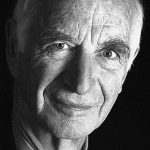
Many expansive and illuminating observations and homages were posted in the “Reflections” section included with “Remembering James Hillman: A Gathering to Offer Tribute and Celebrate the Life and Work of James Hillman” in its original appearance at the initial website of Pacifica Graduatae Institute Alumni Association. We have collected them here, with posting dates, for your exploration and further reflection.
Reflections
On April 26, 2012, I had a dream that I was at a birthday party for James Hillman, whom I had the good fortune to meet during my attendance in the Myth Studies program. Although I knew noone at the gathering, which was in a large hall, he was warm and avuncular, making me feel at peace and at home. When I awoke, I looked up his birthday and discovered to my delight it is a transposing of the date of my dream: 4-12-26!
Joy Greenberg | Ph.D. Mythological Studies, 2012 | 19 Sept 2012
James Hillman was very generous. First, it was with Pacifica and the time he spent with us, and then, to me personally. After one engaging afternoon’s class where he was our guest speaker, he signed his books. One of the ones he signed for me was Dream Animals, co-authored by Margot McLean (painter). He volunteered to send it to her for her signature if I left the book with him. Of course, I agreed and immediately gave him money to cover all expenses for mailing envelopes and postage. “Dinner on me?” met with a warm smile. The memory of the book was lost in the pressure of class papers and upcoming dissertation preparation. One day it suddenly arrived with both signatures. Now, every time I go to his section in my library, I smile fondly in remembering James Hillman’s generosity to me, to Pacifica, and to the explorers of the psyche everywhere.
Dennis Archambault | Ph.D. Mythological Studies, 2010 | 19 July 2012
My husband and I attended the Hillman event and were touched in a profound way. It was my first visit back to Pacifica since my graduation in 1996. I was surprised to feel such affinity to the place and the people and it reminded me of how Pacifica continues to live in me and my work. You had a long conversation with my husband, Mark, and he was excited by your enthusiasm. Coming home, we decided to gather the alumni of Pacifica that I know and have a salon in Hillman’s honor. It is planned for this Saturday evening. Mark was sure you would want to know about this so I am writing to share it. I live in Redding, California. I have contacted people I know from Yreka, Chico, and Weaverville. I will be happy to share information about the alumni organization if you let me know what would be appropriate to say.
Alexa Singer-Telles | MA Counseling Psychology, 1996 | 12 Apr 2012
I had the opportunity to have James Hillman instruct our Depth Psych class around 2002-2003. I asked him about Baruch Spinoza practicing alchemy; Hillman said it didn’t happen. I was sure Spinoza must have done so and began my research that day. That catalyzed my work in alchemy, focused my dissertation, and led me to my current work identifying women alchemists. I always meant to tell him how much I appreciated his small but very meaningful time as a maggid for me.
website visitor | 12 Apr 2012
The memorial events for James Hillman’s life and scholarship were broadly and deeply satisfying. I was honored to have played a part in the concluding ceremonial planting of oaks in honor of Hillman. I wish to acknowledge the help of Matt Buckmaster and his dad in collecting the sea shells from the Goleta Slough Chumash midden. Matt was “stoked” to make that contribution to the Institute as a former student and still supporter of the Institute and its work. These approximately 200-year-old shells were included in the pouches the memorial participants placed around the Hillman Oak for me to inter after the ceremony. Thank you Matt and all the attendees.
Marshall Chrostowski | Land Manager, Pacifica Graduate Institute | 11 Mar 2012
I’m a graduate of the Mythology program and feel fortunate to have experienced James Hillman in the classroom on numerous occasions where he has surely voiced many a wise and provocative thought — but what comes to mind today are a few simple words from a Master Class that I attended in 2010. Hillman knew he was ill during this time.
As the small group of about 35 people was settling in, Hillman asked us to disrupt our orderly rows of chairs and form some chaos. “Come closer,” he said. “Closer!” And when we had created our ragged circle around him (or “the round thing” as the Irish would call it) Hillman was more insistent still. “CLOSER! Come closer!” He urged — and was so intensely passionate about this detail. He had something important to share and he wanted us to draw near.
Then, on Sunday, when the oak tree was being planted at the Hillman memorial, Michael Meade’s words echoed as we all gathered in a circle around the tree. “Closer! Come closer!” Michael said, and then repeated again as he encouraged us to draw nearer: “Closer!”
Closer, James.
website visitor | 09 Mar 2012
I am currently working on my dissertation in Mythological Studies and James Hillman is the fourth member of my committee — the “Imaginal Reader.” My methodology is based on his insistence on always returning to the image, which he called, variously, re-version, epistrophe, and “mythical thinking.” So as I write, I imagine him reviewing my work and calling me strictly to account whenever I slide into reductionism and theory.
website visitor | 09 Mar 2012
Student and Alumni Sparks after presenting reflections on Sunday: Matthew Green (Ph.D. Depth Psychology 2007); Jennifer Sandoval, (Ph.D.c Clinical Psychology); Elizabeth Robinson (Ph.D. Mythological Studies 2011); Dianne Travis-Teague, Associate Director of the Office of Alumni Affairs; Gustavo Beck, (MA Mythological Studies 2009); and Jason Butler (Ph.D.c Clinical Psychology).
website visitor | 08 Mar 2012
I am left with a taxonomy of scatological phrases and a dream to guide me through the threshold of dissertation, my journey of research as ceremony:
“See invisibly the invisible.”
“Nature is dying because culture is dying.”
“The psychic house has many rooms and this house does not belong to us.”
“Why must we OWN it?!”
“Notice, listen, appreciate, something is ALWAYS speaking.”
“The vision of soul given by anima is more than one perspective . . . Anima attaches and involves.”
Dream in the threshold between Sunday night and Monday morning: visited in dream by James. He walked through the doorway, perspiration clinging to his face — he was grinning from ear to ear. He said to me, “It has been a long walk so far, I can’t wait to see what is around the bend!” As respite, I offer him a bowl of soup, he gratefully accepts. He sits on top of the table with his legs crossed enjoying the meal, still grinning. I sit in front of him on the red tile floor that is warmed by the sun streaming through the window and say, “Yes James, tell me all about it”. He commences a great storytelling.
I was awakened from this very moment in the dream by a 4.0 earthquake as we lay sleeping in our daughter’s home in the Oakland hills.
What an incredible weekend in tender Temenos, honoring “the elder’s transition to ancestor” … punctuated by “the living fence” (thanks for this one Joe Coppin) of landscape speaking: WAKE UP!
Gina Belton | MA Depth Psychology, 2011 | 06 Mar 2012
The weekend tribute of James Hillman was a profound experience of how deeply rooted his teachings, his spirit, and his ideas have permeated the Pacifica culture. The event was vibrant with the energy of imagination and love. May his memory be a blessing!
Alexa Singer-Telles | MA Counseling Psychology, 1996 | 04 Mar 2012
I wish I could be there and join you. Thank you for remembering my father. Is there a chance to read some of the presentations at a later point? Greetings from Zurich.
Susanne Hillman | Ph.D. Art History | 04 Mar 2012
I’ve heard people say that James Hillman was a lousy mentor, impatient and cold and cutting. That could be–as an older gent he reserved the right to be irritable–but he always took an interest in my work, especially terrapsychology. When we were introduced years ago because of it, I told him about nightmares I had while exploring the Missions of California, and he told me about the imaginal smell of blood on Civil War battlefields. “We stole this country,” he said, “and enslaved people to work it, and during the Civil War, we paid for what we had done in blood.” He also doubted whether we had really learned the hard lessons of colonialism.
After we met, Hillman sent occasional postcards and notes and people my way, suggesting areas to investigate during my dissertation work (“have you looked up Keith Basso?”), telling filmmaker Kevan Jenson about terrapsychology, and reading emails I sent to his wife Margot. At the “Nature and Human Nature” conference a few years back (Rick Tarnas and Margot presented there), I arrived early and found Hillman sitting off to the side in a section of chairs next to the stage. I had not seen him in a while and knew he liked baseball, so I came up behind him and said, “Well, here you are in the bullpen!”
During the presentation, as I insisted that Pacifica, where Freud and Jung rule, needed to recognize Pierre Janet and William James as earlier founders of depth psychology, I was delighted to see Hillman nodding his head vigorously. He was like that: supportive with a word or nod that said plenty briefly. After the conference we chatted for a bit, and he complained about our having only twenty minutes each to present: “The god who really ruled here today was Chronos.”
I never needed Hillman to be a fully available mentor or father figure, having benefitted richly from both earlier in my life, and I certainly disagreed with some of what he said or emphasized, especially his phobia about anything related to ascension, resurrection, and hope. I told him once that he was the Nietzsche of depth psych because he took joy in turning things upside down just for the hell of it. He laughed and considered it a compliment. But his brilliant insights lighted so many landscapes of the heart. Without his emphasis on archetypes as modes of apprehension–at Whose altar do you now stand?–I don’t know how I would have learned to listen to estuaries, hillsides, rivers, and cityscapes as psychic beings whose speech we repeat all the time without knowing it. For we are always in the discourse of some specific place. Just look how the hilly ups and downs of northward-thrusting, Dionysian San Francisco show up when we work and play in the City that from space sheds bridges like vines from the head of Bacchus, transsexual god of drama, ecstasy, dismemberment, redemption, and (of course) altered (altared?) states of consciousness. Imagine Los Angeles millions of years ago: a clamshell-shaped basin rotating upward like a stage from the oceanic depths. Or think about the Sophean presence of wise St. Barbara staring out at the ocean from the heights among which sits Pacifica. The Chumash called her Hutush.
On the day James died I wrote his wife Margot:
“I don’t know what time James died this morning, but we had an earthquake in Berkeley very early. I am imagining a fierce-hearted pagan soul on its way to the Otherworld passing through the Hayward Fault and causing the earth to tremble briefly in tribute. No angels, no celestial choirs, just one massive lurch from the depths.”
Craig Chalquist | Ph.D. Depth Psychology, 2003 | 04 Mar 2012
Coming to Pacifica changed my thinking and views on psychology and counseling. The study of depth psychology, Hillman’s work on soul and the polytheistic nature of psyche were paticularly important to the change in my world view/consciousness. I was struggling with whether to seek licensing.
It was 1995, during my 2nd year at Pacifica, that James Hillman came to my practicum class. This was back when classes were at the Lambert Road campus; the classroom was in a small outlying building. He walked into the class and perched on the edge of a long table up front. Our teacher seemed afraid of him, stuttered a greeting. One of his legs swung freely, his hands settled on the other. He looked out at us with those piercing eyes and said he was not here to give a lecture (he had done that earlier at a joint session of both classes & talked on the shadow side of the greening of America), but to answer any questions we may have.
I sat in the back of the class realizing this was my chance to share about my conflicts re licensure and get his feedback/thoughts on the subject. I raised my hand & he acknowledged me with a nod of his head. My heart was pounding, my cheeks hot, my palms clammy. I had read almost everything he had written and listened, in person or via recording to many of his lectures. I knew how acerbic his tongue could be towards anyone who asked a question he deemed stupid. But I knew I was being offered a chance I may never have again, so I shared with him how his theories had transformed my thinking, beliefs & personal life. I shared with him my ambivalence re licensing; about feeling called to a craft and purpose that seemed at odds to the traditional, the “standards of practice” of the very professsion I was trying to join.
He listened patiently, without interruption. When the response came it was succinct but changed the trajectory of my career/life since. He cocked his head to the side, got this impish grin on his face and said: “Be a coyote.”
Donna May | MA Counseling Psychology, 1996 | 03 Mar 2012




